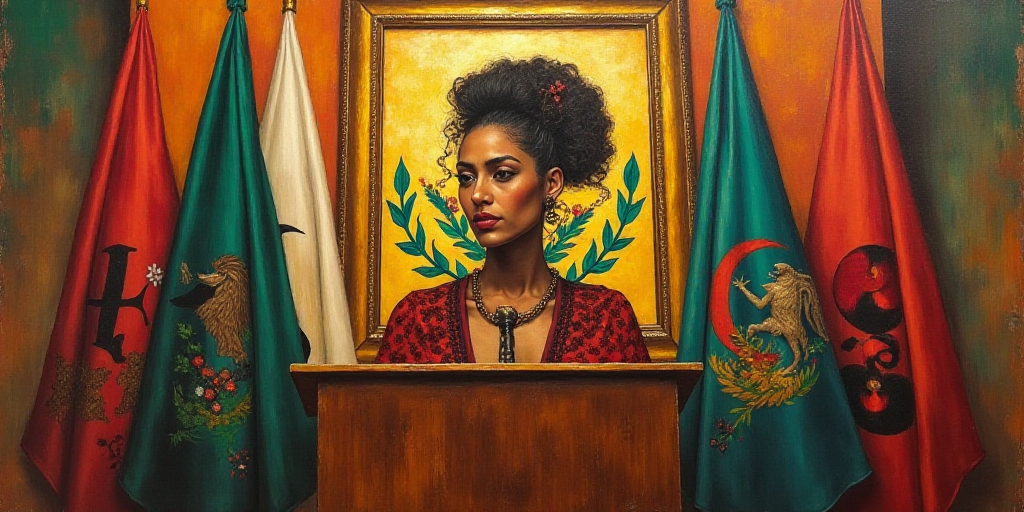Background on Key Individuals and Relevance
Claudia Sheinbaum, the President of Mexico, has called for transparency from the United States regarding a reported judicial agreement with Ovidio Guzmán, son of Joaquín “El Chapo” Guzmán. This situation has garnered attention due to Ovidio’s ongoing legal proceedings in the U.S., and the fact that Mexico had previously requested his extradition.
Who is Claudia Sheinbaum?
Claudia Sheinbaum is the current President of Mexico City, serving since 2018. She assumed the role after her predecessor, Miguel Ángel Mancera, stepped down to run for the governorship of Mexico City. Sheinbaum, a member of the National Regeneration Movement (Morena) party, has been instrumental in shaping policies and addressing issues within Mexico City. Her recent demand for transparency reflects her commitment to upholding justice and maintaining Mexico’s sovereignty.
Who is Joaquín “El Chapo” Guzmán?
Joaquín Archivaldo Guzmán Loera, known as “El Chapo,” is a notorious Mexican drug lord and former leader of the Sinaloa Cartel. He gained international fame for his ability to evade capture multiple times before being apprehended in 2016. Guzmán’s criminal empire has had significant impacts on both Mexico and the United States, making him a central figure in the ongoing drug war.
Who is Ovidio Guzmán?
Ovidio Guzmán is the son of Joaquín “El Chapo” Guzmán. He has been implicated in drug trafficking activities and is currently under investigation by Mexican authorities. His case has gained attention due to his family’s ties to one of Mexico’s most notorious drug lords and the controversy surrounding his recent arrest attempt in Culiacán, Mexico.
Key Events and Developments
- Sheinbaum’s Demand for Transparency: On Wednesday, President Sheinbaum called on the U.S. government to be transparent about any agreements related to Ovidio Guzmán, emphasizing that he was sent from Mexico and that there are pending investigations against him in the country.
- Family Members Entering the U.S.: On Tuesday, it was confirmed that 17 family members of Ovidio Guzmán were authorized to enter the United States as part of a negotiation with the Department of Justice. The Mexican government clarified that none of these individuals were wanted by Mexican authorities.
- U.S. Charges Against Sinaloa Cartel Members: The U.S. Department of Justice filed its first formal charges for narcoterrorism against members of the Sinaloa Cartel, specifically targeting Pedro Inzunza Noriega (alias “Sagitario”) and his son, Pedro Inzunza Coronel (“Pichón” or “Pájaro”). Both are accused of leading a large and sophisticated fentanyl production and trafficking network operating from Mexico on behalf of the Beltrán Leyva faction.
Key Questions and Answers
- Q: Why is President Sheinbaum demanding transparency from the U.S.?
A: Sheinbaum is seeking clarity on any agreements between the U.S. and Ovidio Guzmán, as his extradition request from Mexico remains unresolved, and there are ongoing investigations against him in the country.
- Q: Who are the family members that entered the U.S., and why?
A: Seventeen family members of Ovidio Guzmán were authorized to enter the United States as part of a negotiation with the Department of Justice. Mexican authorities confirmed that none of these individuals were wanted by Mexican law enforcement.
- Q: What are the charges against members of the Sinaloa Cartel?
A: The U.S. Department of Justice has filed narcoterrorism charges against Pedro Inzunza Noriega (alias “Sagitario”) and his son, Pedro Inzunza Coronel (“Pichón” or “Pájaro”). Both are accused of leading a significant fentanyl production and trafficking operation from Mexico, representing the Beltrán Leyva faction.
Context and Impact
The demand for transparency by President Sheinbaum highlights the complex relationship between Mexico and the United States in their joint efforts against drug cartels. The recent developments underscore the need for clear communication and cooperation between both nations to ensure justice is served while respecting each country’s sovereignty.






